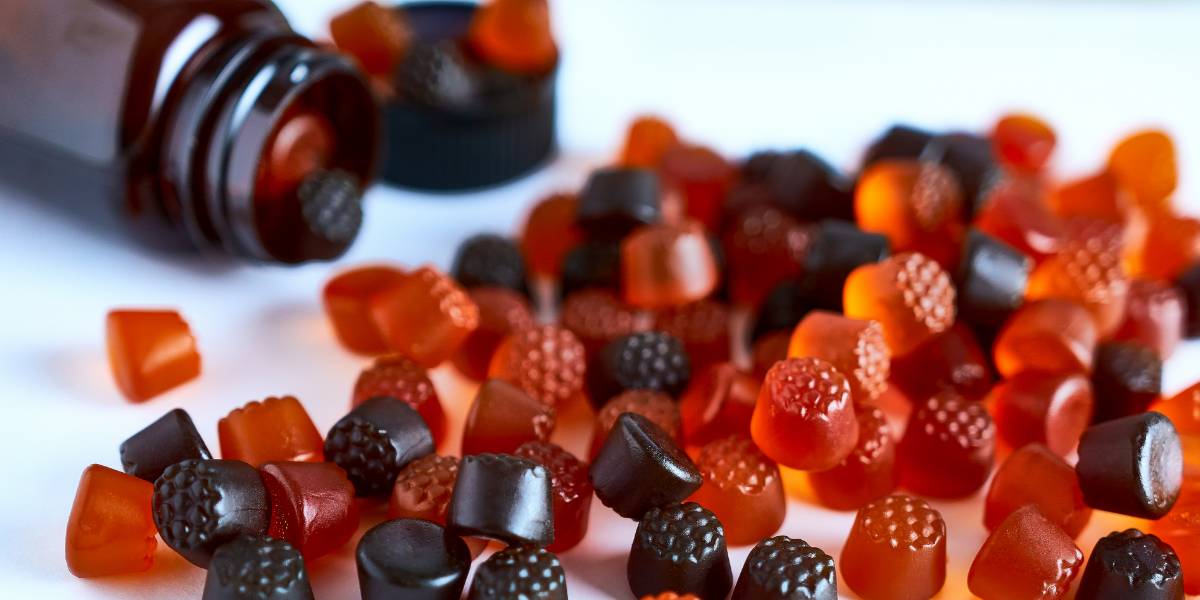The booming market in chewable supplements needs to be taken seriously because these products “aren’t benign”, health experts have warned.
Figures show that globally, gummy supplements are worth around $7.3 billion, with claims they can help with anything from sleep and mood, to improving digestion and healthier skin.
The popularity of hyaluronic acid and collagen – used in anti-aging products – has also led to the development of chewy supplements containing these ingredients, adding to the market explosion.
- Vitamin D supplements reduce risk of melanoma
- Dietary supplements and vitamins do not prevent heart disease and cancer, research shows
The appearance and marketing of these so-called ‘candyceuticals’ has a role to play in their attraction, experts say.
Social media platform TikTok is currently inundated with posts of “influencers” describing various degrees of weight loss from using apple cider vinegar gummies.
Charles Spence, a professor of experimental psychology who specialises in sensory marketing, said: “Research shows that various pharmaceuticals work better when taken in colourful tablet, or multi-coloured capsule than when in standard white tablet form.
“Generally speaking, more/stronger colour is associated with stronger taste/greater efficacy. Ever wondered why [indigestion medicine] Pepto-Bismol is pink? The owner’s intuition was that children would be more likely to drink it if it looked pink and thus sweet.”
He went on to say: “By explicitly selling supplements in gummy/chewy form, there is both a link to sweets, which people like, and also a very strong cue that this will not taste bad.”
The taste may make these products more enticing, but according to dietician Sophie Medlin, “it’s hard to get a meaningful amount of anything into a gummy because of all the other stuff you have to put in there to make it taste OK, to make the mouth feel OK, and to make it look cool.”
The high level of sugar found in gummies do not have “a particular benefit”, according to postdoctoral medical scientist and nutritionist Dr Federica Amati, unless someone has difficulty taking traditional supplements.
With some gummy supplements listing three types of sugar in the ingredients list – glucose syrup, sugar and glucose – consumers have been urged to look out for them on packaging, with Sophie Medlin saying: “If the first listed ingredient is sugar, that’s the main thing you’re getting. These companies use multiple forms of sugar to capitalise on the fact that consumers don’t know the names of all the different types.”
Experts have also questioned some of the claims made by the manufacturers of gummy supplements. For example, probiotic gummies which makers say can ‘restore the balance of bacteria in your gut’ contain high levels of artificial sweeteners, which Dr Amati says are “disruptive for the gut microbiome”.
Concerns have also been raised about the use of the pigment titanium dioxide in some gummy supplements. Valerie Stark, a neuroscientist and director at gummy company Novomins, commented: “Some gummy companies use it because it’s a convenient and cheap ingredient that creates a specific structure and taste, and adds this pastel coating on pills. But in 2022, the EU banned it. The UK was supposed to follow, but Brexit cancelled all those decisions. We’ve looked at the research, and it isn’t something we want to have in our gummies.”
Sophie Medlin shared her concerns, saying: “It’s considered too high risk to be added to anything for human consumption, but until we get our act together in terms of regulation, people will exploit these legal loopholes.”
She went on to say: “There’s a market for almost demedicalising supplements and making them feel less like a pill and more fun, mainstream and Instagrammable, when we need to be taking this seriously because supplements aren’t benign – you can take too much and they can cause harm.”
Whether supplements bring about health benefits at all is something scientists are still wrestling with. Dr Amati said: “There isn’t a huge amount of evidence to support supplementing, unless we are addressing specific deficiencies. Pregnancy and supplementing a vegan diet are the biggest exceptions.
“Making sure we have a good diet and healthy lifestyle should be much more evidence-based than any gummy or pill.”







